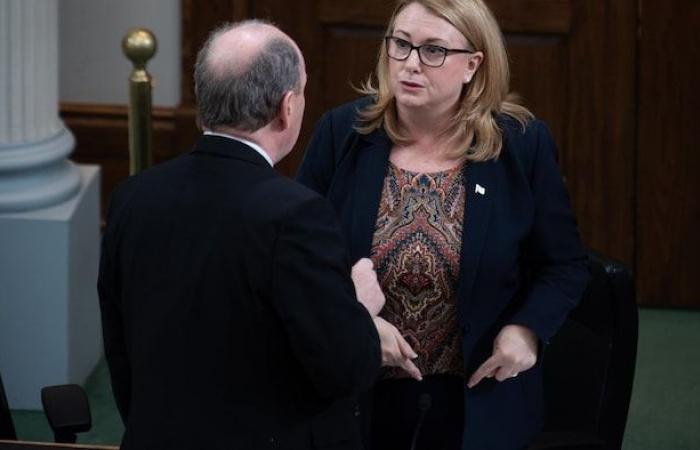A former CEO of Hydro Newfoundland and Labrador is convinced that his province was fooled by Hydro-Québec. The Quebec state-owned company should pay tens of billions of dollars more for Churchill Falls electricity, according to Bill Wells, who criticizes the new memorandum of understanding concerning the plant, signed in December.
We got fleeced. Most Newfoundlanders and Labradorians don’t even realize it
believes the former number 1 at Hydro NL, whose comments were quickly rejected by the current head of the Crown corporation.
This is not true
affirms Jennifer Williamswho led the negotiation of the MOU on behalf of Hydro NL. The agreement is very, very fair
she continues.
We have an obligation to make the best deal possible as employees of a Crown corporation.
Open in full screen mode
Hydro Newfoundland and Labrador CEO Jennifer Williams on the sidelines of the special debate on the agreement in principle for the Churchill Falls hydroelectric station on January 7.
Photo: The Canadian Press / Paul Daly
When the agreement in principle was unveiled last month in front of hundreds of politicians and business people from Saint-Jean, Quebec Premier François Legault promised that if the agreement would bring in $227 billion by 2075 to the coffers of Newfoundland and Labrador, it would also allow Hydro-Québec to save $200 billion during the same period.
Pour Bill Wells, who led Hydro NL. between 1996 and 2005, the statement noted that Newfoundland and Labrador could have obtained significantly more money for river power Churchillwhile obtaining a new contract that both provinces would describe as win-win
.
Open in full screen mode
The Prime Minister of Quebec, François Legault, as well as his counterpart from Newfoundland and Labrador, Andrew Furey, announced the agreement in principle with great fanfare on December 12 in Saint John. (Archive photo)
Photo: The Canadian Press / Paul Daly
Replacement costs under the microscope
The 50-year agreement in principle replaces the current contract Churchill Fallssigned in 1969, and paves the way for the construction of new hydroelectric facilities in Labrador, including the Gull Island. The large proportion of the energy produced at the new power stations will be reserved for Quebec.
Under the MOU, the average electricity price of Churchill Falls by 2075 will be 5.9 cents per kilowatt hour. According to Hydro NL, the price will gradually increase from 1.63 cents per kilowatt hour in 2025 to 7.84 cents in 2041, and then to 19.4 cents in 2056 and 37.24 cents in 2075.
-Bill Wells underlines that Hydro-Québec estimates that the production cost of new energy projects under study in Quebec would be 13 to 16 cents per kilowatt hour.
These replacement costs must be taken into account
affirms Bill Wellswho is also a former member of the board of directors of the Churchill Falls (Labrador) Corporationi.e. the company that operates the plant.
Sans Churchill, [Hydro-Québec] would spend around 16 cents. […] If this is the case, why would we accept that she pay less than 2 cents at the start of the new contract?
I don’t know exactly how much more money we could have gotten. Between $100, $125 and $130 billion, without a doubt
he continues. If we had negotiated hard, perhaps we could have obtained all $200 billion.
The current CEO defends herself
Jennifer Williams rejects her predecessor’s comments, repeating, as she did during a special debate on the agreement in principle in the House of Assembly, that the agreement in principle represents the best possible deal for Newfoundland and Labrador
.
We must propose an agreement that pleases both parties
she adds, recalling that Hydro-Québec, by negotiating the agreement in principle, agreed to tear up the current contract 17 years earlier than planned.
She points out that if all expected payments under the new agreement in principle were spread between 2041 (the end of the current agreement) and 2075, the average price of electricity would increase from 5.9 to 13.3 cents per month. kilowatt hour.
We decided to receive this money earlier and over a longer period
affirms Jennifer Williams.
A long-term agreement
Skeptics of the agreement, including Bill Wellsemphasize that Hydro-Québec will benefit the most during the first decades of the agreement, when the price of electricity Churchill Falls will always be relatively low. Newfoundland and Labrador will gain the most money towards the end of the agreement, when the price has increased.
These critics argue that the long-term price increase depends on an escalation clause that has not yet been finalized. According to Hydro NL, this clause will be based on the price of electricity in the Quebec and northeastern United States markets, as well as on Hydro-Québec’s replacement costs.
Bill Wells believes that it is very difficult, if not impossible, to predict the evolution of energy markets over the next 50 years.
Jennifer Williams maintains, however, that the agreement and the indexation clause, once finalized, will protect Hydro NL. market fluctuations and ensure that the provincial treasury earns the promised revenues.







